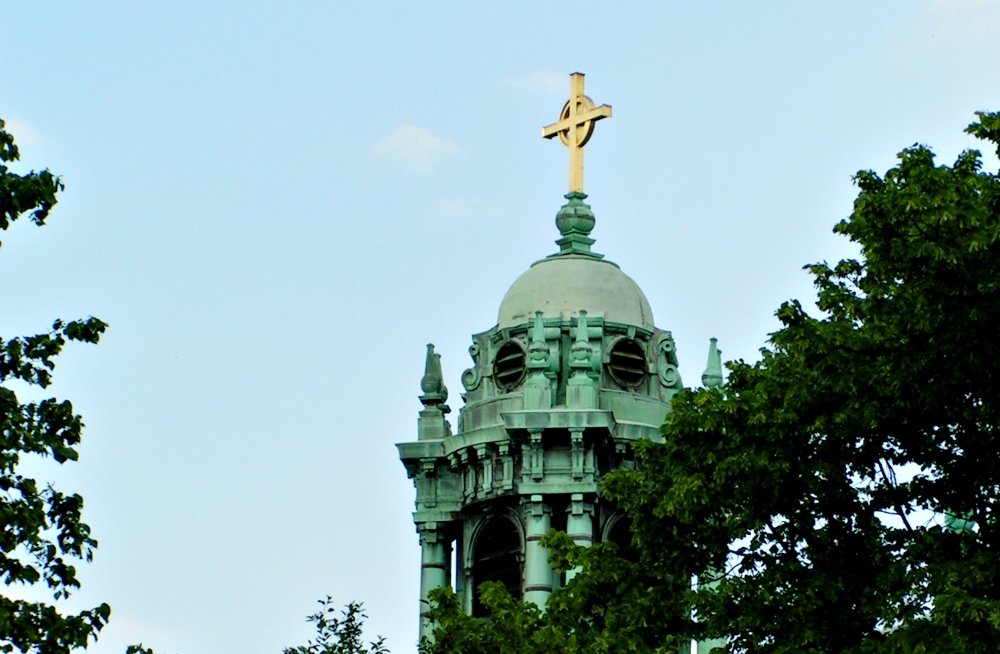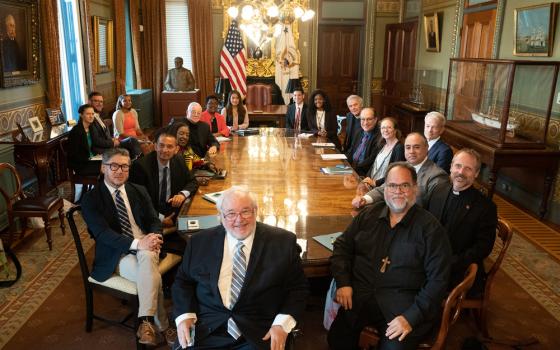
A cross is seen atop a building on the campus of the College of the Holy Cross in Worcester, Massachusetts. (Wikimedia Commons/George Rypysc III)
Professor Tat-siong Benny Liew holds the Class of 1956 Chair of New Testament Studies in the Religious Studies Department of the College of the Holy Cross in Worcester, Massachusetts. His views have touched off a firestorm after a conservative campus newspaper published a story that surveyed some of his writings in which, among other things, Liew suggested Jesus might have been a "drag king" who harbored "queer desires." The controversy is sure to stir up a hornet's nest, and it should, because core values are at stake here.
Here are some excerpts from a chapter Liew wrote for a book he also edited in 2009:
If one follows the trajectory of the Wisdom/Word or Sophia/Jesus (con)figuration, what we have in John's Jesus is not only a "king of Israel" (1:49; 12:13-15) or "king of the Ioudaioi" (18:33, 39; 19:3, 14-15, 19-22), but also a drag king (6:15; 18:37; 19:12).
And this:
Women pollute since their moist and soft nature is also more susceptible to the assaults of wanton desires, erotic or otherwise. In short, women are wet and (thus) wild. I am suggesting that John's constant references to Jesus wanting water (4:7; 19:28), giving water (6:35), and leaking water (19:34) speak to Jesus' gender indeterminacy and hence his cross-dressing and other queer desires.
What to say? I am no Scripture scholar, but I know one when I see one. And I was lucky enough to have studied Romans with the late Jesuit Fr. Joseph Fitzmyer, which was like studying organized crime with Al Capone. What Liew has penned is silliness on stilts, but not any kind of silly, a specifically modern and academic variety of silly. An academic, wishing to get noticed, wraps him or herself in a theory that seeks to titillate. The theory does not explain the subject matter; it overwhelms it. This is not really about the Gospel, is it? No: It is about Liew and his own academic fetishes.
As I read those quotes, a metaphor popped into my head, one that is not entirely divorced from gender-bending thought. This kind of textual analysis is what I imagine it would be like to get a tour of New York City from Jack McFarland, the character on the TV show "Will & Grace" played by Sean Hayes. He would take you to the Empire State Building, but he would not focus on its history as the tallest building in the world for many years, it having been built during the Depression, or its stunning art deco designs. No, it would be the place where he broke up with some guy. He might bring you to see the splendors of Central Park, but you would not learn about the collaboration between Frederick Law Olmsted and Calvert Vaux that created this wonderful public space. No, he would point out the different areas where he made out with someone over the years. In short, the tour would not be about New York City, it would be about Jack.
It gets worse. In that same essay, Liew goes on to write:
Fast forwarding to the passion narratives, Conway observes that John's Jesus is a "quintessential man" because he "reveals no weakening to the passions that might undercut his manly deportment" (2003a, 175). If this is so, there is also something quintessentially queer here. During the passion, Jesus is not only beaten (18:22-3; 19:3) and flogged (19:1); his body is also nailed and his side pierced (19:18, 23a, 34, 37; 20:24-28). Oddly, John defines Jesus' masculinity with a body that is being opened to penetration. Even more oddly, Jesus' ability to face his "hour" is repeatedly associated with his acknowledging of and communing with his Father (12:27-28; 14:12, 28; 16:10, 17, 28; 17:1-25; 18:11), who is, as Jesus explicitly states, "with me" (16:32) throughout this process, which Jesus also describes as one of giving birth (16:21-22). What I am suggesting is that, when Jesus' body is being penetrated, his thoughts are on his Father. He is, in other words, imagining his passion experience as a (masochistic?) sexual relation with his own Father.
I called Robin Darling Young, a patristic scholar who knows something about textual analysis. "It is just bizarre," she told me. "Ludicrous, mischievous, perverse."
She added, "It is extremely disrespectful — not only to the Christian community, but to the ancient Jewish person portrayed in the texts."
Young, like me, was especially struck by the outrageous linking of sexual passion with the crucifixion, which was a form of torture. "The real problem is not that this is blasphemy, although it is. It minimizes rape and torture. I thought of Perpetua, Oscar Romero, those brutalized in concentration camps. It is irresponsible." For the record: I think blasphemy is a real problem too.
Advertisement
In an academic context, there is something worse than offensive or kooky: There is stupid. In a statement, the president of the school, Jesuit Fr. Philip Boroughs, mentioned Liew's writings were offensive, but I think we all can imagine times when an academic should be willing to offend as she searches for truth. Stupid is another matter. Boroughs also pointed out that Liew is a family man and a churchgoing one at that, but he wasn't hired on that basis, was he? He was hired as a scholar and so writing something stupid should matter and matter a lot.
This incident put me in mind of a discussion I once witnessed between two prominent theologians. (The event was held under the Chatham House Rule so I can't identify the theologians.) One argued that the only necessary guarantor of normativity within the theological community should be peer review. The other argued that there must be an ecclesial dimension to theological normativity. It will surprise no one that I concurred with the latter position.
I wonder what the theologian who thought peer review is sufficient would make of this situation with Liew. In medieval times, one of the reasons a guild was given a monopoly over a particular kind of work was so that its members could police themselves and guarantee that the work would be done well. "We call ourselves a guild," said Young, "but we don't function as one." The academy "can adjudicate plagiarism, but we can't adjudicate an interpretation, even a really awful one."
How will the theological community react to this controversy? This is a question first and foremost for the community of scholars at the College of the Holy Cross. I hope they will recognize that episodes like this threaten academic freedom, which, like all freedoms, comes with responsibilities, at a bare minimum with the responsibility to be intellectually serious.
Some will fret that any limitation on academic freedom imperils the whole, that a chilling effect will lead to a deep freeze in creative thought. But I think the opposite is true: Without a category marked "so irresponsible it demands forfeiture of the status the academy normally conveys," I think academic freedom will be more, not less, imperiled.
Just as I criticized Ross Douthat's book on Pope Francis because it failed basic journalistic standards, theologians who support academic freedom need to take the lead in differentiating between pushing an envelope and pushing nonsense.
Indeed, at a time when so many small and medium-sized colleges are having difficulty keeping the doors open, and we know that the 2020 election will debate the degree to which college should be made more affordable, a small cadre of gender-obsessed pseudo-scholars can do enormous harm to the future of higher education. I fear, however, that the cultural zeitgeist will not encourage any sense of mutual responsibility for the academic guild and, indeed, those peddling gender ideology or queer theory will be only too happy to politicize their opinions, which is something fascists and communists did to the field of education, not something the education field should do to itself.
What should be done is this: Holy Cross should invite Liew to quit. If he does not, he should not be allowed in a classroom. Let those other professors who did not do due diligence on Liew's tenure application think of what they could do with the money the school is contractually obligated to pay him, especially when they have to cover his classes.
Let other college presidents and theology school deans come together as they came together to issue the Land O'Lakes statement, and say what people will whisper but no one yet wants to say out loud: This gender ideology nonsense is a fad. Let the educators state that Catholic education is going to take the lead in confining that fad to the rearview mirror. Theologians who dabble in this kind of analysis can apply elsewhere, but they are not wanted at a Catholic college or university.
Those who do not like to consider the potential for backlash should explain how they think President Hillary is doing midway through her term. I am not suggesting that the Catholic academy give a heckler's veto to uneducated yahoos. I am saying that it must demonstrate a capacity to police itself so that educated yahoos do not get into the lecture hall.
Professors who peddle unhinged theories do great harm to the entire educational enterprise at a time when that enterprise is already challenged in a variety of ways. Someone has to step up to the plate and be a grownup. Someone has to say, "Enough!"
[Michael Sean Winters covers the nexus of religion and politics for NCR.]
Editor's note: Don't miss out on Michael Sean Winters' latest: Sign up to receive free newsletters, and we'll notify you when he publishes new Distinctly Catholic columns.









